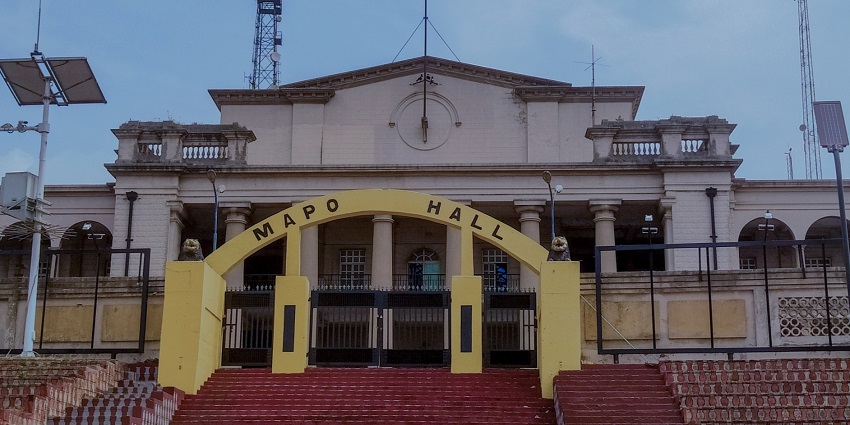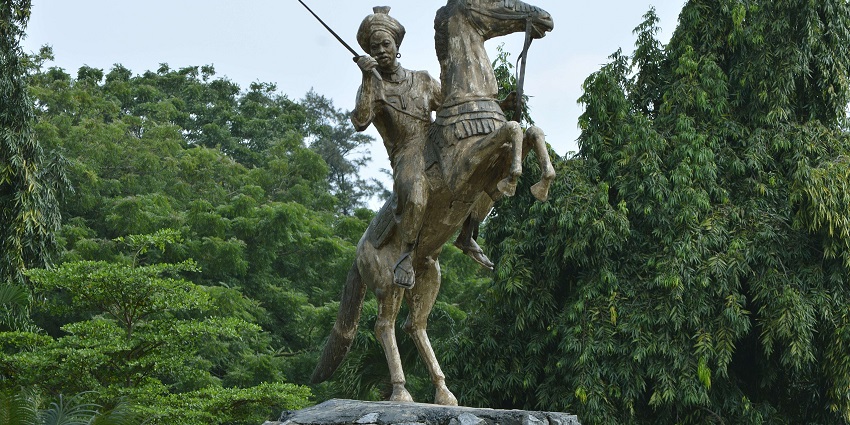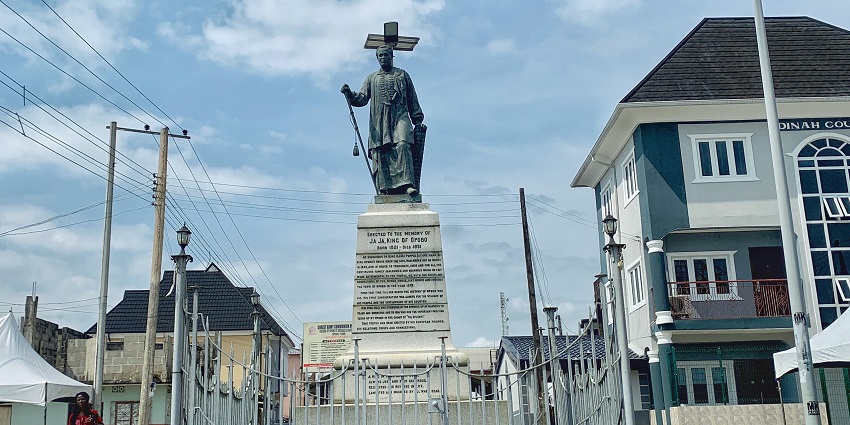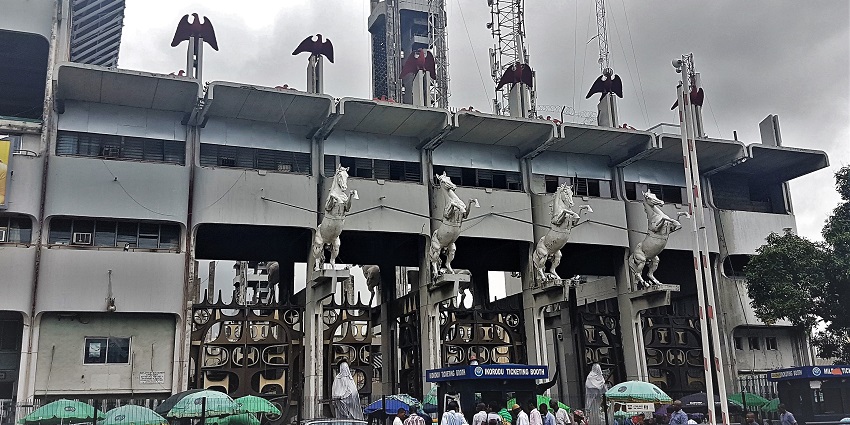Nigeria has a rich culture and history, featuring many important monuments that tell the story of the country. Ranging from colonial period architecture to pre-colonial marvels, monuments in Nigeria showcase a rich blend of native creativity and colonial presence. Each one gives insight into the country’s political, religious, or social changes over time. Unlike regular historical spots, these monuments are protected because of their importance and lasting value. They share stories of struggle, leadership, and creativity. When people visit these sites, they can connect with Nigeria’s history and appreciate the art and legacy that continue to influence the nation today.
Top 10 Monuments In Nigeria
Here is a list of monuments in Nigeria, from old sites to colonial buildings, offering history and its journey to becoming a nation.
1. National War Museum, Umuahia

Photo: Umargana1 / Wikimedia Commons
The National War Museum in Umuahia is an important spot in Nigeria, as it details the military history of Nigeria relative to the Nigerian Civil War (1967 to 1970). Opened in 1985 in Abia State to exhibit monuments and commemorate events from the war, the museum contains both indoor and outdoor exhibits, encompassing a plethora of military memorabilia in the form of armoured tanks, aircraft, naval vessels, and indigenous traditional weapons of warfare. Perhaps the most striking exhibits were the made-in-Biafra (Biafran) war machines, which underscored the brilliance and adaptive rationality that the country exercised whilst in wartime.
Entry Fee: ₦500 / ₹95
2. First Storey Building In Nigeria

Photo: Omoeko Media / Wikimedia Commons
The First Storey Building in Nigeria, found in Badagry, Lagos State, is an important piece of colonial history and architecture. Constructed in 1845 by Reverend Henry Townsend from the Church Missionary Society, it’s the oldest two-storey building still standing in Nigeria. Made from burnt bricks and timber, this structure was used as a mission house and as a residence for early missionaries. Presently, the building functions as a museum exhibiting historical relics, such as the original Bible and photographs. This landmark bears evidence of the early presence of Christianity and Western education in Nigeria.
Entry Fee: ₦300 / ₹57
3. Mapo Hall

Photo: Deolubillions / Wikimedia Commons
Mapo Hall is among the most recognisable colonial monuments in Nigeria and sits on the top of Mapo Hill in Ibadan, Oyo State. The imposing building was commissioned by British Governor Sir William MacGregor and built in 1929, initially as a town hall and, to date, a symbol of political and historical prominence in southwestern Nigeria. The building has a neoclassical design and offers great views of the city, making it popular with both visitors and locals. Over the years, it has been the site of many political events and cultural gatherings, playing a key role in the area’s history.
Entry Fee: ₦500 / ₹95
4. Abuja National Mosque

Photo: Shiraz Chakera / Wikimedia Commons
The Abuja National Mosque, also known as the Nigerian National Mosque, is the most iconic religious building and sacred monument in Nigeria. The mosque is located in the centre of Abuja and was completed in 1984. It serves as the country’s national mosque for its Muslim community. This magnificent structure is instantly recognisable and dominates the skyline with its golden dome and four towering minarets. Along with a mosque are several other significant buildings in the complex, including a library, conference hall, and the offices of the Islamic Centre.
5. Tafawa Balewa Tomb And Mausoleum

Photo: Teemages / Wikimedia Commons
The Tafawa Balewa Mausoleum and Tomb in Bauchi State is a national shrine honouring Nigeria’s first and only Prime Minister, Sir Abubakar Tafawa Balewa. It is a quiet tribute to his memory and contribution to Nigeria’s independence. The complex has a plain yet respectful mausoleum where his body is interred after his untimely assassination in 1966. Visitors can check out the memorial area, which has a library, mosque, and museum filled with his personal belongings and some historical photos. The National Commission for Museums and Monuments takes care of the site, making it a peaceful place.
Entry Fee: ₦300 / ₹57
6. Bower’s Tower

Photo: Eukoha / Wikimedia Commons
Bower’s Tower is a historical edifice located at the peak of Oke-Are Hill; it sits at the highest point in Ibadan, Nigeria. Bower’s Tower was constructed in 1936 to honour Captain Robert Lister Bower as the first British Resident in Ibadan. The 60-foot tower provides a bird’s-eye view of the city’s sprawling landscape. Constructed of stone and iron, the tower represents colonial presence and is a reminder of the complicated history of Nigeria. Bower’s Tower is not just an amazing spot for visiting and sightseeing, but it is also an active piece of living history.
Entry Fee: ₦200 / ₹38
7. Queen Amina Statue Monument

Photo: Omoeko Media / Wikimedia Commons
In Zaria, Kaduna State, sits the Queen Amina Statue Monument, a tribute paying homage to one of the country’s greatest female warriors. Queen Amina of Zazzau is remembered for her rule in the 16th century, which included many military campaigns that increased her kingdom’s size. Her statue of her horse with a sword teaches us about her might and willpower. In addition to showing history, it encourages Nigerian women and women everywhere. Many are drawn to the Queen Amina Statue in Nigeria because it represents a well-known figure and lets people obtain valuable knowledge about the important contributions of pre-colonial Nigerian society and Africa.
8. Cathedral Church Of Christ

Photo: Sho photography / Wikimedia Commons
Lagos’s Cathedral Church of Christ enjoys enormous respect among Nigerian religious monuments. The diocesan headquarters of Lagos is housed in a Gothic Anglican cathedral built in Marina and opened in 1946. The church stands out with its Gothic style and includes stained-glass windows, fine wood carvings and a tall tower. Designed by Bagan Benjamin and built with imported materials and the help of skilled Nigerian labour, the building reflected a mix of foreign ideas and Nigerian skills. Not only is the cathedral used for worship, but it is also a famous landmark where important religious and national events are conducted.
9. King Jaja Of Opobo Monument

Photo: Hadassah Photostorie group / Wikimedia Commons
The King Jaja of Opobo Monument shows the strong efforts of a leader to resist and leave a legacy in Nigeria’s violent past. Set in Opobo Town, Rivers State, the monument recognises Jaja, a 19th-century trade king who went from slavery to start the Opobo Kingdom. The bronze statue placed in memory of him is a reminder of his work fighting British colonial trade rules and protecting his people’s independence. Walking through the square, visitors can explore the monument, which draws people eager to know more about Nigeria’s anti-colonial movement.
10. Sir Abubakar Tafawa Balewa Square (TBS Monument)

Photo: Sidhant Bendre / Wikimedia Commons
The Sir Abubakar Tafawa Balewa Square is a major national monument in Lagos, Nigeria. It was completed in 1972 to remember the first Prime Minister of Nigeria, Sir Abubakar Tafawa Balewa, and now symbolises the nation’s past following independence. The area of the square was the site of the Race Course, where independence was granted to Nigeria in 1960. Carved into the monument are huge images of white horses and eagles, standing for strength and dignity. National events, parades and gatherings regularly take place at the TBS Monument as well.
Entry Fee: N/A
The officially designated monuments in Nigeria are important representations of the country’s diverse and incongruous heritage. From war memorials and colonial architecture to caves from pre-colonial times and sculptures of historic leaders, each monument relates a part of Nigeria’s continuing story. In visiting these monuments, visitors can walk through history while recognising both architectural virtuosity and cultural richness. Plan a trip with TripXL today.
Cover Photo: Olasunkanmiariyo / Wikimedia Commons


 WhatsApp
WhatsApp
 Twitter
Twitter









